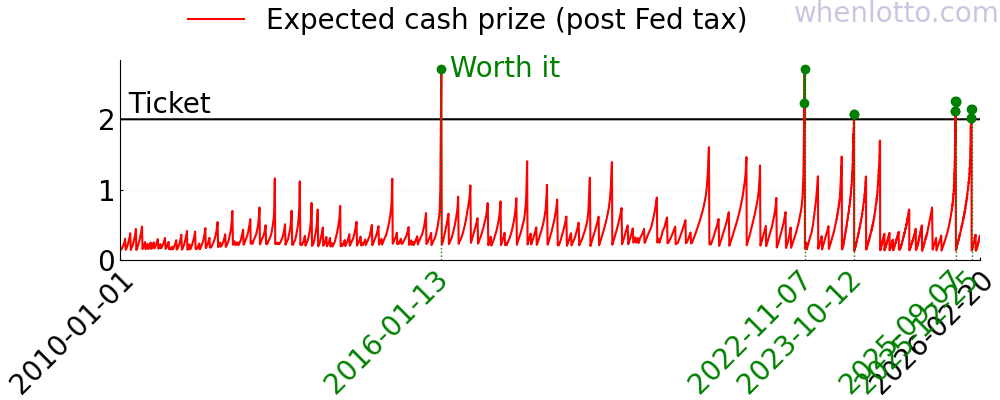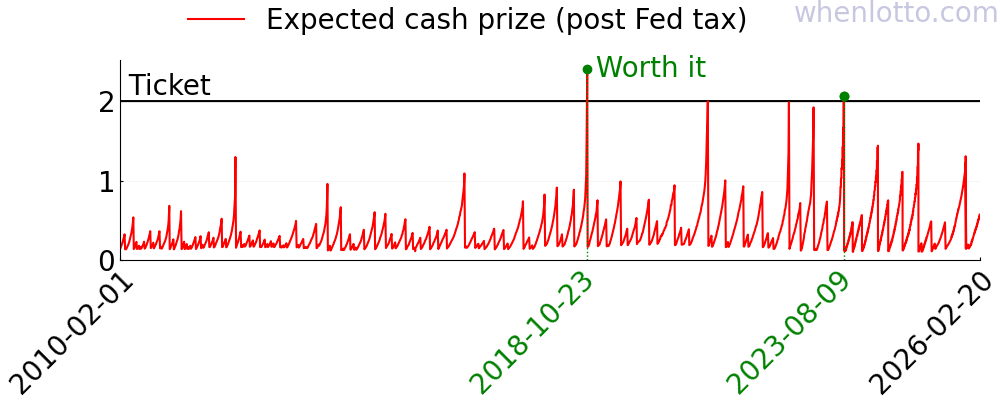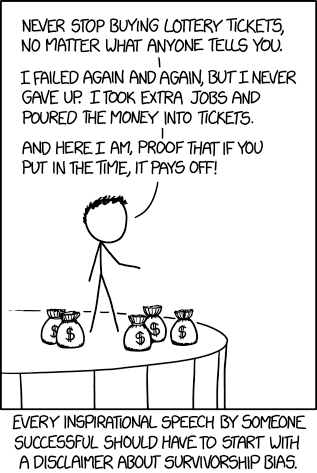Lottory, is it worth it?
The goal of WhenLotto.com
Every once in a while, you hear news articles about how big the jackpot for one of the famous lotteries has grown. You probably already know that the odds of winning the jackpot in a lottery are extremely low (lower than the odds of being struck by lightening in a given year), but the big jackpots may get you wondering... could participating in the lottery ever be worth it? Whenlotto.com is here to answer that for you!
When is a lottery worth it?
Lotteries have clear rules that allow us to mathematically compute the probability (or odds) of winning every prize, including the jackpot. They even report these odds themselves. The mathematical concept that answers the question of whether the lottery is worth it is the concept of expected value. The expected value is the average value of the outcomes you would get if you had the chance to repeat an experiment a lot of times. For example, if you had the chance to participate in a lottery with billions and billions of tickets, the expected value of the prize gives you the prize that each of your lottery tickets would win on average. Now, if the expected value of the prize won by a ticket is more than the ticket price itself, that's when we can conclude statistically that the ticket is worth it!
How can we compute the expected value of the ticket prizes?
As an example, let's compute the expected value for the Mega Millions lottery at the time of writing. It just so happens that the jackpot has reached $640 Million, which is the seventh largest in Mega Millions history!
Are Mega Millions tickets now expected to have a higher prize than their price? Based on the odds table, we can multiply the value of each prize by its probability (odds) and sum up the results to get the final expected prize:



Is it ever worth it to buy lottery tickets?
At this point, given that even a historic jackpot is not statistically worth investing in, you may be wondering if it has it ever been worth it to buy lotto tickets. It turns out that occasionally the jackpot grows so big that the expected value of prizes is larger than the ticket price even after taxes. Since 2013, this has happened only in 6 draws (4 Powerball draws and 2 Mega Millions draw), assuming there is no state tax (for states that have high lottery taxes, even some of the following drawes were not worth it):
- Jan 13, 2016: Powerball jackpot of $1.59 Billion. Expected prize: $2.23 (11% return on investment).
- Nov 5, 2022: Powerball jackpot of $1.66 Billion. Expected prize: $2.32 (16% return on investment).
- Nov 7, 2022: Powerball jackpot of $2.04 Billion. Expected prize: $2.82 (41% return on investment).
- Oct 12, 2023: Powerball jackpot of $1.76 Billion. Expected prize: $2.45 (23% return on investment).
Powerball
- Oct 23, 2018: Mega Millions jackpot of $1.60 Billion. Expected prize: $2.14 (7% return on investment).
- Aug 8, 2023: Mega Millions jackpot of $1.58 Billion. Expected prize: $2.12 (6% return on investment).
Mega Millions
So if you bought tickets on one of these days, you could have considered your participation as an investment with some expected returns (6% to 41%). But those who have participated in any other draw since 2015 besides the above 6, were statistically expected to lose money. Note that even in those extremely rare draws when the expected prize is more than the ticket price, the probability of winning the jackpot is still infinitesimal. Therefore, you are most likely to lose your money. However, in the off chance that you win, the jackpot prize is large enough to make up for all the losses. So, you would certainly still be better off investing in something with less risk and better returns, such as an S&P500 ETF.
Of course, participating in the lottery is fine as long as you think of the lottery like the movies, an amusement park, or bungee jumping: you are spending money to enjoy the dream of winning the lottery. So despite what winners may tell you, the lottery is almost never a good investment:

By Omid Sani
Last update: 5/20/2024